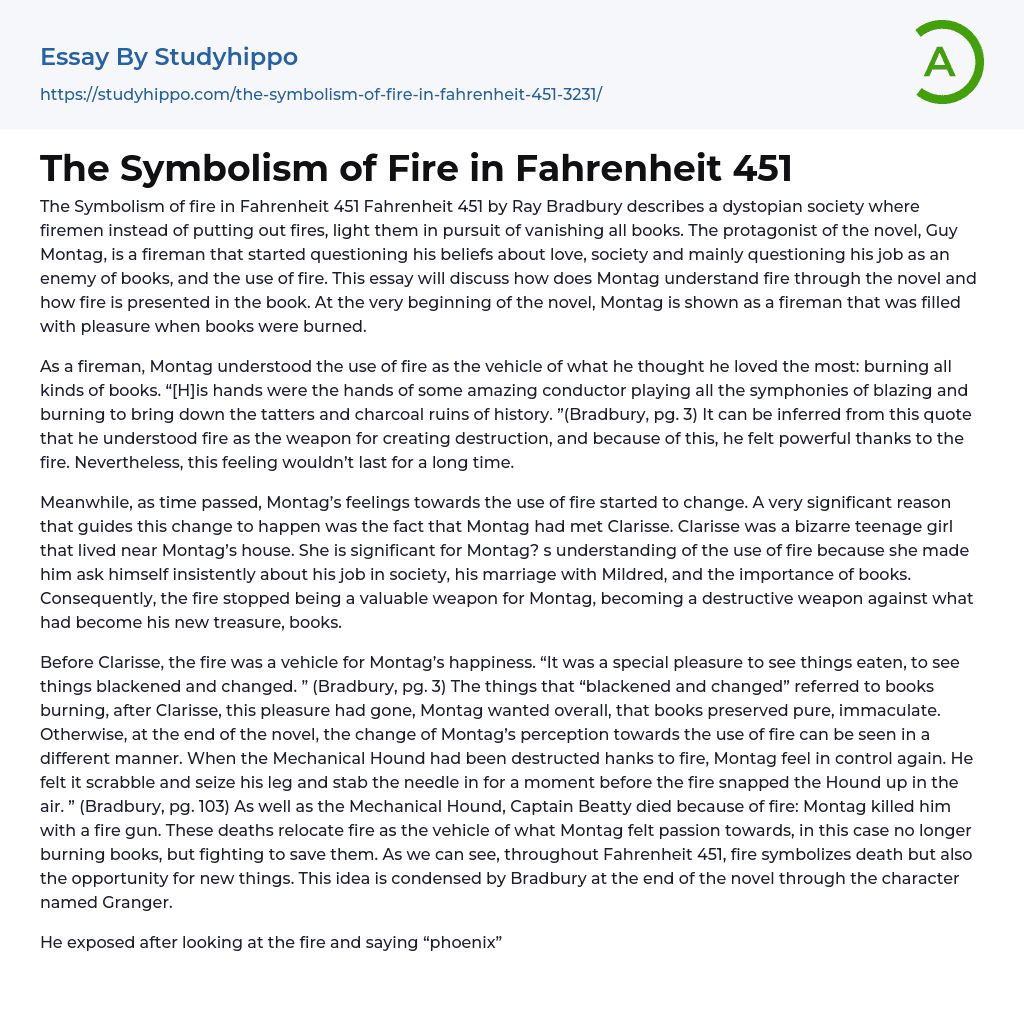The Symbolism of fire in Fahrenheit 451 Fahrenheit 451 by Ray Bradbury describes a dystopian society where firemen instead of putting out fires, light them in pursuit of vanishing all books. The protagonist of the novel, Guy Montag, is a fireman that started questioning his beliefs about love, society and mainly questioning his job as an enemy of books, and the use of fire. This essay will discuss how does Montag understand fire through the novel and how fire is presented in the book. At the very beginning of the novel, Montag is shown as a fireman that was filled with pleasure when books were burned.
As a fireman, Montag understood the use of fire as the vehicle of what he thought he loved the most: burning all kinds of books. “[H]is hands were the hands of some amazing conductor playing all th
...e symphonies of blazing and burning to bring down the tatters and charcoal ruins of history. ”(Bradbury, pg. 3) It can be inferred from this quote that he understood fire as the weapon for creating destruction, and because of this, he felt powerful thanks to the fire. Nevertheless, this feeling wouldn’t last for a long time.
Meanwhile, as time passed, Montag’s feelings towards the use of fire started to change. A very significant reason that guides this change to happen was the fact that Montag had met Clarisse. Clarisse was a bizarre teenage girl that lived near Montag’s house. She is significant for Montag? s understanding of the use of fire because she made him ask himself insistently about his job in society, his marriage with Mildred, and the importance of books. Consequently, the fir
stopped being a valuable weapon for Montag, becoming a destructive weapon against what had become his new treasure, books.
Before Clarisse, the fire was a vehicle for Montag’s happiness. “It was a special pleasure to see things eaten, to see things blackened and changed. ” (Bradbury, pg. 3) The things that “blackened and changed” referred to books burning, after Clarisse, this pleasure had gone, Montag wanted overall, that books preserved pure, immaculate. Otherwise, at the end of the novel, the change of Montag’s perception towards the use of fire can be seen in a different manner. When the Mechanical Hound had been destructed hanks to fire, Montag feel in control again. He felt it scrabble and seize his leg and stab the needle in for a moment before the fire snapped the Hound up in the air. ” (Bradbury, pg. 103) As well as the Mechanical Hound, Captain Beatty died because of fire: Montag killed him with a fire gun. These deaths relocate fire as the vehicle of what Montag felt passion towards, in this case no longer burning books, but fighting to save them. As we can see, throughout Fahrenheit 451, fire symbolizes death but also the opportunity for new things. This idea is condensed by Bradbury at the end of the novel through the character named Granger.
He exposed after looking at the fire and saying “phoenix” that “there was a silly damn bird called a phoenix…every time he burnt himself up he sprang out of the ashes, he got himself born all over again. And it looks like we're doing the same thing, over and over, but we have one damn thing the phoenix
never had. We know the damn silly things we just did. … [S]omeday we? ll stop making the goddamn funeral pyres and jumping in the middle of them. ” (Bradbury, pg. 163) In the novel, Montag can be taken as an allegory of the phoenix. He represented destruction in different ways.
First, as explained before, his job as a fireman happened by means of destruction, the destruction of his perception towards society and the fight against it as well as the fight against Captain Beatty. However, he also represented renewal. His new ideas and lifestyle reflected that something new had been born from what have been burned. Montag represents the dialectics that occurs in human society but also in humans’ spirits, dialectic in old ideas and feelings fight against new ones giving birth to a new idea and a new feeling, and if it might be a strong battle it may give birth to a new way of life.
In conclusion, we can see that fire is a very important element of the novel Fahrenheit 451, it is a crucial element for the development of the story and for the development of Montag? s character. As we can see, throughout the novel fire represented destruction; nevertheless, it also represented renewal, leaving us –the readers- a warm feeling, a feeling of hope.
Bibliography
- Bradbury, Ray, Fahrenheit 451. 1953
- Book Summary essays
- Metaphor essays
- Reader essays
- Rhyme essays
- Literary devices essays
- Villain essays
- Books essays
- Genre essays
- Literary Criticism essays
- Writer essays
- Protagonist essays
- Simile essays
- Poem essays
- Book Report essays
- Book Review essays
- Greek Mythology essays
- Plot essays
- Tragic Hero essays
- Coming of Age essays
- Play essays
- Rhetoric essays
- Rhetorical Question essays
- Translation essays
- Understanding essays
- Reason essays
- Character essays
- Letter essays
- American Literature essays
- Literature Review essays
- Utopia essays
- Poetry Analysis essays
- Dante's Inferno essays
- Between The World and Me essays
- Incidents in The Life of a Slave Girl essays
- Flowers for Algernon essays
- Myth essays
- Everyday Use essays
- Boo Radley essays
- Genesis essays
- Richard iii essays
- Alice in Wonderland essays
- On the road essays
- Ozymandias essays
- The Nightingale essays
- Holden Caulfield essays
- Animal Farm essays
- 1984 essays
- A Hanging essays
- Shooting An Elephant essays
- A Tale Of Two Cities essays




